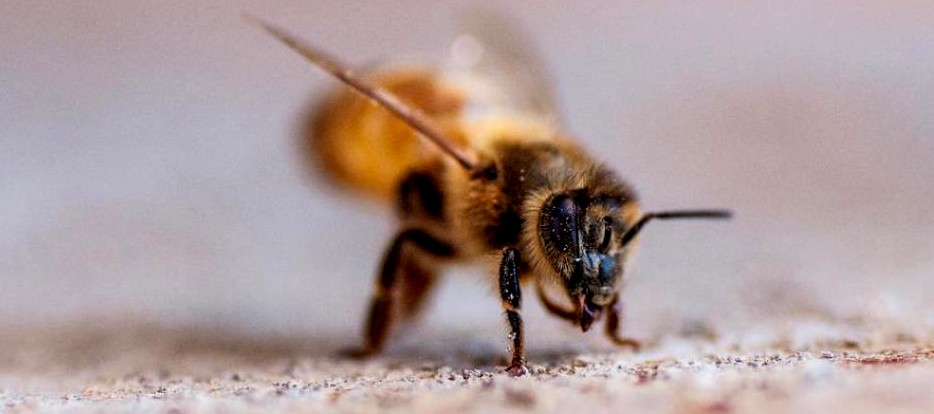From: https://gumshoenews.com/2017/04/16/humanity-in-crisis-part-7-mass-extinction-and-the-death-of-bees/
Humanity In Crisis, Part 7: Mass Extinction and The Death of Bees
 Bee
Bee
by Dee McLachlan
As much of the Western world celebrates Easter Sunday, maybe it is time to reflect how religion (mainly Christianity) has done a disfavour to diversity on the planet — and thus our survival as a species.
In Genesis 1:26 — Then God said
“Let us make man in our image, after our likeness. And let them have dominion over the fish of the sea and over the birds of the heavens and over the livestock and over all the earth and over every creeping thing that creeps on the earth.” [English Standard version]
Let man have dominion — authority, or rule over all life on earth?
All 8.7 million+ species?
Well, there’s the problem isn’t it? That attitude might be the very cause of the diminution of the biosphere.
And with this mindset, we have allowed corporations to destroy much of the earth’s natural habitat — with complete abandon, and without any thought to consequence.
Why worry?
I did an ecological science degree at the University of Cape Town in the 70s — and although I never continued in that field, I did come away with the idea that for humanity to continue to exist on this planet — it must be a haven for many species.
I personally believe that our very survival depends on it.
Biodiversity provides stability in water resources, soil fertility, pollution breakdown, nutrient storage, climate stability, and the ability to recover from unpredictable events.
Let’s think about the direct correlation between biodiversity and our survival. The more habitats and species we eliminate, the less ability humanity has for coping with global changes. And too, a diverse biosphere will adapt to climate fluctuations much better than depleted ecosystems.
The loss of land animals has been fairly well documented, but the world’s oceans are now facing a loss of species comparable to the great mass extinctions of prehistory. The seas are degenerating far faster than anyone has predicted.
Tropical Forests
There have been several moments when I felt a great despair.
The first time was when I was in a lecture listening to my ecology lecturer, Dr Eugene Moll, describing the rate of deforestation of the Amazon. In the mid 1970s, he declared, the Amazon rain-forest was being cleared at the rate of one tennis court size per minute (was my recollection).
I believe the figure around 2010s was about 16 tennis courts per minute. Now satellite analysis reveals that since 2000 an area equal to 50 football pitches has been destroyed every minute.

Back then, I was left with a sense of hopelessness — and so it seemed easier to get lost in the world of movies where one could script-in happy endings.
The second time I felt this deep despair was when I was in Los Angeles about 8 years ago — and listened to an interview on the radio. The man was talking about the bee populations dying off in North America.
Why worry about bees?
They are the canary in the mine. They are informing us that all in not well.
A globalresearch article reports that,
“the biggest foreboding danger of all facing humans is the loss of the global honeybee population.”
Bees pollinate a large number of crops: almonds, apples, blueberries, cantaloupes, cashews, coffee, eggplants, grapes, kiwis, mangoes, okra, peaches, pears, peppers, strawberries, apricots, avocados, cranberries, cucumbers, tangerines, walnuts and watermelons.
The article continues:
“The consequence of a dying bee population impacts man at the highest levels on our food chain, posing an enormously grave threat to human survival. Since no other single animal species plays a more significant role [than the bee] in producing the fruits and vegetables that we humans commonly take for granted yet require near daily to stay alive, the greatest modern scientist Albert Einstein once prophetically remarked, ‘Mankind will not survive the honeybees’ disappearance for more than five years’.“
About every third mouthful of food we eat is the result of bee pollination, so it is a concern when Honeybee Colony Collapse Disorder (CCD) results in huge loss of bee populations.
Now, honeybees are mostly trucked across America to pollinate an estimated $40 billion worth of the nation’s agricultural produce each year.
Lets Talk Just Almonds
Approximately 31 billion honeybees converge on California’s Central Valley each February to pollinate the almond trees — all 800,000 acres, stretching from Sacramento to Los Angeles.
Between October and February bee keepers truck in more than one million boxes of hives from all over the US to California.
 Bee truckers
Bee truckers
Chemicals
But it seems that man’s attempted dominion over all creeping things is not really working. Initially the bee decline was attributed to the Varroa mite in 1987, then
“Monsanto, Dow, Bayer and other large chemical manufacturers aggressively glommed onto the bee industry selling genetically modified insecticides and herbicides as the quick and easy fix to remedy the parasitic invasion, only to weaken the bees’ natural genetic defenses to fight off the parasite.
“From genetically altered corn, Monsanto produced an insecticide called Bacillus thuringiensis (Bt), which once ingested by bees, Bt binds to receptors within the bee’s stomach lining that keeps the bee from eating. Of course this weakens the bees, causing the breakdown of the inner stomach wall, which in turn makes the bee susceptible to spores and bacteria.
“To further compound the problem, for years the lobbying power of the chemical giant denied causing damage to the bee’s internal immune capacity for resistance to parasites, which of course only continued to kill off the bee population worldwide. Thus, continued chemical use, especially in America, only exacerbates this growing problem.”
We are warned that the chemicals and toxins sprayed on fruit and vegetables require time and washing, before we consume them. So does it not make sense that these toxins might negatively affect bees pollinating these plants? This was confirmed by a study from the Harvard School of Public Health, which found that pesticides directly contribute to CCD. When exposed to some pesticides, bees go insane and don’t know how to return home.
Mono-culture has also contributed to the decline of bees.
But whats the worry — scientists are already designing the “bee-drone”.

Imagine this! Humans won’t have to worry about pesky bees — that sting. The giant food corporations will just have millions of little bee drones to go out and pollinate our genetically modified crops for us.
Happy Easter.
No comments:
Post a Comment
Note: only a member of this blog may post a comment.